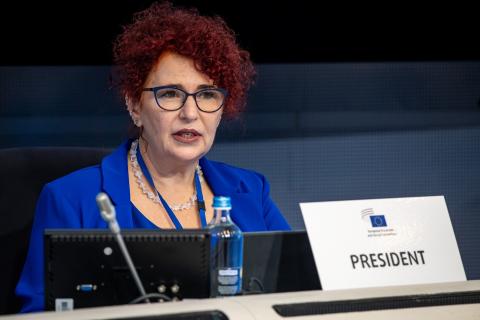European Economic
and Social Committee
The economy, the environment and people's well-being must go hand in hand in post-COVID EU
At the July plenary session of the European Economic and Social Committee (EESC), the president, Christa Schweng, and members met with prominent speakers to discuss the future European economy after the pandemic.
Economic prosperity, care for the environment and people's well-being can and must go hand in hand. This was the key message delivered by the EESC president, Christa Schweng, at the debate on A post-COVID economy that works for all - Towards a well-being economy? held at the EESC plenary session on 7 July 2021.
Ms Schweng argued that in future we clearly needed to monitor and value broader aspects than those reflected in GDP more effectively: Aspects like our health, our nature, our education, our ability to innovate and our communities matter
, she said.
Referring to "combining the idea of prosperity with the possibility of social progress on a global scale", with the 2030 Sustainable Development Goals as the foundation, she added: The time has come for the EU to work on a comprehensive strategy: the EESC is ready to support the reflection on the foundations for a post-COVID economy that works for all and includes new indicators for economic performance and social progress that can provide a comprehensive picture of people's well-being
.
Beyond GDP: towards a well-being economy
Four prominent speakers took part in the plenary debate.
Tim Jackson, from the Centre for the Understanding of Sustainable Prosperity, made clear that it was health - and not wealth - which was the foundation for prosperity and the foundation for thinking what kind of economy we wanted after the pandemic. He pointed out that GDP had many limitations and that it was important to break the "GDP growth dependency" and start reflecting on how welfare systems could be maintained in economies which do not have the expected level of growth.
Fabrice Murtin, from the Organisation for Economic Cooperation and Development (OECD), maintained that well-being per se was a very complex system and that there was not one single economy of well-being but many economies. He stressed that it was vital to start shaping people‑centred policies and that social inequality was a systemic weakness and lowered efficiency.
According to Sandrine Dixson-Declève, representing the Club of Rome, it was crucial to focus on healthy people within a healthy Europe and move from GDP-based growth to welfare and security. The lessons learned from the COVID-19 pandemic could be used to understand what was essential and bring about change.
Finally, James Watson, from Business Europe, said that GDP was originally conceived as a measure for commercial activity but it still made sense to use it in spite of its limitations. The way forward would be to complement it with a broader and balanced scorecard made up of other indicators such as economic, social and environmental indicators.
A people-centred economy
Taking the floor during the debate, Séamus Boland, president of the Diversity Europe Group, emphasised that societal progress and an economy that works for all could only be achieved through a transition to an alternative model of development firmly rooted in the SDGs and that the COVID‑19 crisis was the opportunity to get it right.
Stefano Mallia, president of the Employers Group, said that with new priorities such as the EU Green Deal, NextGenerationEU, a Just Transition and climate neutrality by 2050 we would have a whole set of new indicators to consult. To deliver high-quality jobs and sustainable growth, we needed two pillars: a strong and resilient industrial basis in order to remain at the forefront of global technology and innovation, as well as open markets and a rules-based multilateral system which preserves EU interests and values.
Oliver Röpke, president of the Workers Group, said that, following the strong commitment to the targets of the social pillar at the Porto summit, the well-being economy should also cater for working people and their families, ensuring decent wages, strong collective bargaining and strong worker participation to manage the green and digital transitions. He added that economic recovery should go hand in hand with social well-being if it was to be sustainable.
Lastly, Peter Schmidt, president of the Section for Agriculture, Rural Development and Environment (NAT) and rapporteur for the EESC opinion on The sustainable economy we need, concluded by saying that a well-being economy was based on serving people and that the EU must take the opportunity afforded by the pandemic to reflect on our weaknesses and come up with proposals.
Downloads
-
The economy, the environment and people's well-being must go hand in hand in post-COVID EU
